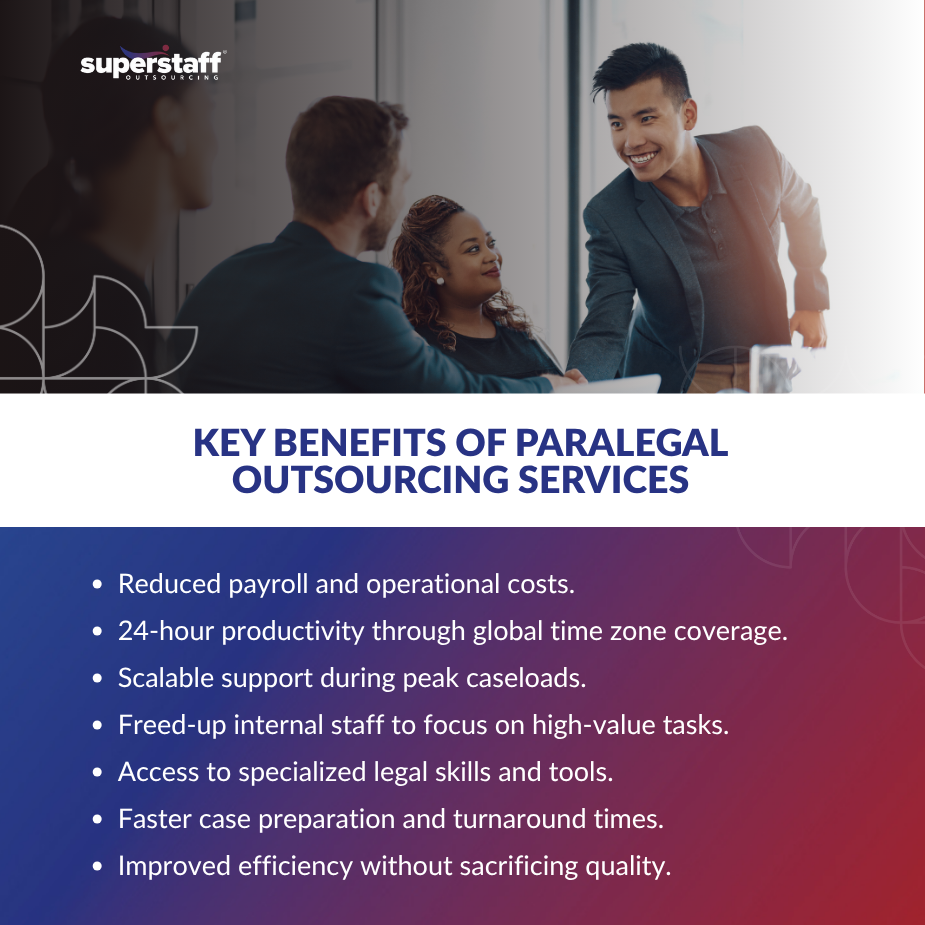
Outsourcing paralegal work is no longer just a cost-saving tactic—it’s a smart strategy for growing legal teams. As legal departments face mounting caseloads, tighter budgets, and increasing demands for responsiveness, many are reevaluating how they structure support roles. Enter paralegal outsourcing services—a flexible, scalable solution that allows law firms, solo practitioners, and corporate legal teams to stay competitive without overextending internal resources.
From drafting contracts and conducting legal research to preparing for trial, today’s outsourced paralegal professionals bring specialized skills and efficiency to the table. Offshore and nearshore providers, particularly those based in countries with strong legal process outsourcing (LPO) infrastructures, now offer high-quality support that rivals in-house performance—often at a fraction of the cost.
This guide breaks down everything you need to know to confidently outsource paralegal services. Whether you’re exploring outsourcing for the first time or looking to optimize an existing arrangement, you’ll find actionable insights to streamline your workflow, ensure compliance, and maintain the professional standards your clients expect.
What Is Paralegal Outsourcing?
Paralegal outsourcing involves delegating legal support tasks to remote professionals, either domestically or offshore. While attorneys are responsible for legal representation and advice, paralegals provide essential support through research, drafting, and administrative tasks.
It’s important to distinguish between general legal process outsourcing (LPO) and paralegal outsourcing services. LPO can include a wide range of services such as document review, litigation support, and contract management. Paralegal outsourcing specifically targets those tasks traditionally performed by in-house paralegals, making it more targeted and streamlined.
Common outsourcing models include:
- Freelance or contract-based paralegals hired for short-term projects.
- Vendor-based solutions, such as firms offering managed legal support.
- Business Process Outsourcing (BPO) partners providing full-time or part-time remote paralegals.
You can choose to outsource:
- Onshore, where paralegals operate within the same country and legal framework.
- Offshore, where tasks are handled by professionals in countries like the Philippines, India, or South Africa.
Remote paralegals often collaborate with U.S.-based teams using cloud-based tools like Clio, MyCase, or NetDocuments, maintaining a seamless workflow and centralized case tracking.
Now that we’ve defined it, let’s explore why more firms are embracing this model.
Key Benefits of Outsourcing Paralegal Services
Outsourcing paralegal work delivers measurable value in terms of efficiency, flexibility, and cost savings. Legal teams can offload routine, time-consuming tasks without compromising quality.
Major benefits include:
- Reduced payroll and operational overhead: No need for benefits, office space, or equipment.
- Faster case preparation: By working across time zones, offshore teams contribute to 24-hour productivity.
- Scalable support: Flex staffing during peak periods such as discovery phases or major filings.
- Higher-value focus for in-house staff: Lawyers and internal paralegals can concentrate on strategy, client meetings, and court appearances.
But not all tasks are suitable for outsourcing—let’s look at which ones are.

What Are the Most Common Paralegal Outsourcing Services?
Certain administrative and research-heavy responsibilities are especially well-suited for outsourcing. These tasks are critical to case progression but don’t always require on-site execution.
Top paralegal duties commonly outsourced include:
- Legal research and writing: Supporting attorneys with case law analysis, memoranda, and summaries.
- Document review and e-discovery: Sifting through evidence, emails, and digital records for case relevance.
- Drafting: Preparing pleadings, contracts, motions, and client correspondence.
- Trial preparation: Creating deposition summaries, managing exhibits, and handling docket calendars.
These tasks demand precision, consistency, and legal understanding—qualities that skilled outsourcing partners can reliably provide.
The next question is: how do you know you’re outsourcing these tasks to the right team?
What to Look for in a Paralegal Outsourcing Partner
Choosing the right outsourcing partner requires careful consideration of experience, security, and communication. Your provider should act as a true extension of your legal team.
Key criteria to evaluate include:
- Legal specialization and industry knowledge: Look for teams experienced in your area of practice, whether it’s litigation, real estate, or corporate law.
- Certifications and English proficiency: Paralegals should have appropriate credentials and clear communication skills.
- Data security and confidentiality: Ensure compliance with HIPAA, GDPR, or ABA Model Rules where applicable.
- Responsiveness and cultural fit: Strong communication and understanding of U.S. legal standards are essential.
Once you’ve chosen a provider, setting up operations is the next step.
How to Successfully Integrate Paralegal Outsourcing Services Into Your Team
Effective onboarding and clear processes ensure outsourced paralegals become true extensions of your team.
Best practices include:
- Document roles and responsibilities: Set clear expectations, timelines, and deliverables.
- Use shared legal tech: Cloud-based platforms enable real-time collaboration and file access.
- Schedule regular check-ins: Weekly meetings and progress reviews build accountability.
- Establish confidentiality measures: Limit access to sensitive information based on project needs and implement non-disclosure agreements (NDAs).
Proper integration leads to long-term collaboration and consistent output.
Now that you know how to make it work, let’s address the potential concerns that still linger.
Addressing Common Concerns About Paralegal Outsourcing Services
Many legal professionals hesitate to outsource due to misconceptions or lack of information. Let’s debunk some of those concerns.
Common concerns and facts:
- Quality control: Outsourcing does not mean sacrificing quality—you can implement review processes and performance benchmarks.
- Data security: Reputable providers use encrypted systems, VPNs, and controlled-access platforms.
- Jurisdictional compliance: While paralegals cannot offer legal advice, they can support licensed attorneys under clear supervision.
- Client perception: Many clients appreciate the increased efficiency and transparency outsourcing brings when managed properly.
With concerns addressed, it’s time to map out the first steps.
Getting Started With Paralegal Outsourcing
Launching a paralegal outsourcing strategy is easier than you think with the right approach.
Here’s how to outsource paralegal duties safely and effectively:
- Define your scope of work: Identify repetitive or time-intensive tasks that could be offloaded.
- Choose the right model: Freelancers work for project-based needs, while BPO partners offer long-term scalability.
- Start with a pilot: Test workflows, output, and responsiveness with a small caseload.
- Evaluate and scale: Use key metrics (turnaround time, accuracy, cost) to determine expansion.
Following legal outsourcing best practices ensures your firm remains compliant, efficient, and competitive.
Legal support doesn’t have to be local to be effective.
Make the Most of Paralegal Outsourcing Services—Without the Guesswork
Paralegal outsourcing services offer legal teams a flexible, scalable way to increase efficiency without sacrificing quality. From legal research and drafting to document review and trial support, outsourcing can help reduce costs, accelerate timelines, and improve focus—when done right.
As with any business decision, success comes down to strategy. By knowing what to outsource, who to trust, and how to integrate, your firm can tap into a global talent pool without compromising security or professionalism.
Discover how SuperStaff’s legal support teams can help you streamline operations and meet deadlines without the stress. Reach out today for a custom consultation.






